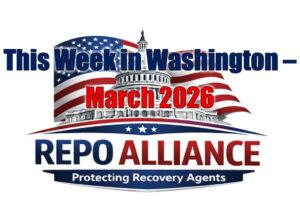EDITORIAL
The arrival of a new year is typically a time for celebration, renewal, and hope. But for those of us in the repossession industry, the sentiment rings hollow. As 2025 begins, we face the same questions, the same systemic issues, and the same dangers that have plagued us year after year. So, Happy New Year—or is it?
This industry is no stranger to challenges, but the pressures on repossession agents have become not only unsustainable but, in many cases, life-threatening. The hazards of our work are no longer limited to the familiar challenges of an agent backing down an unsuspecting consumer’s driveway. They have expanded drastically, now encompassing competition that are not playing by the same rules and requirements because of a troubling trend of bending definitions to allow tow truck drivers of all stripes to repossess vehicles—only to flaunt these repossessions on social media, and infighting among agents over LPR territories.
Auctions now secure impounds, dispatch companies are repossessing vehicles for major rental companies, and the pace of work demanded by lenders is relentless. The question is not if agents are being asked to do more with less but how much further this will go before something—someone—breaks…or dies at the hand of another agent.
The dangers are real and increasing at a rapid tick. Repossession agents are being assaulted and killed on the job at alarming rates, yet the industry marches forward with little regard for these tragedies. Some stakeholders in this space—lenders, forwarders, auctions, and other entities—continue to prioritize the lowest costs and the fastest turnarounds above all else. While there are statements of concern, Go Funds, calls for safety, and moments of silence after fatal incidents, the reality remains unchanged: efficiency and profit reign supreme, no matter the human cost.
It’s a grim double standard. On one hand, the industry outwardly acknowledges the dangers agents face and the need for safety. On the other hand, it perpetuates practices that intensify the risks. Lenders demand cheaper rates, auctions secure impounds with minimal oversight if any at all, and some dispatch companies have now entered the repossession business, often without the experience or protocols necessary to manage the complexities of repossession work. Meanwhile, the weight of these decisions falls squarely on the shoulders of agents, who must navigate an increasingly perilous landscape to fulfill these demands.
The race to the bottom is evident in every corner of the repossession industry. We’ve seen it in the bidding wars and the nationwide one price fits all that force agents to accept lower payments for more dangerous jobs. We’ve seen it in the lack of investment in safety training, tools, and resources. And we’ve seen it in the growing competition from entities outside our traditional space, diluting the industry with players who often lack understanding or respect for the risks involved.
This is not just a matter of economics; it’s a matter of humanity. How many more agents must be injured or killed before we collectively acknowledge that enough is enough? How many more consumers must face harm or even death before we realize that we are dealing with matters of life and limb? How many more families must endure the devastating loss of a loved one because the system continues to prioritize speed and cost over safety and standards?
So, WHAT are we going to do about it?
Change will not come to our sector from above; it must start from within. We need to unify as an industry, coming together to demand better practices and fairer treatment. This means holding lenders and other stakeholders accountable for their decisions. It means advocating for standards, safety protocols and refusing assignments that put agents at undue risk. It means educating new entrants into the space about the realities of the job and ensuring they operate under the same standards we expect of ourselves.
Most importantly, it means valuing our own lives and livelihoods enough to demand that others do the same. The repossession industry is vital to the functioning of the financial ecosystem, but it cannot—and must not—operate on the backs of those who are treated as expendable.
As we step into 2025, the question is no longer whether these issues matter; they do.
The question is whether we will find the courage to collectively stand up, speak out, and push for the changes we need.
Let’s ensure that this year, “Happy New Year” is not just a hollow greeting but a call to action that resonates change throughout our industry.
This year let’s resolve to make safety, standards, fairness, and respect the pillars of our work.
Only then can we truly start the year on a path worth celebrating.
 Vaughn Clemmons
Vaughn Clemmons
President
Automobile Recovery Bureau, Inc.
PO Box 450205
Houston, Texas 77245
Phone: 713.869.6543 Ext. 8002
Fax: 713.880.4525
Cell: 972-877-1130











More Stories
Rising Fuel Costs Are Impacting Repossession Operations
Colorado Bill Aims to Severely Impact All Repossession Operations
Today is Fallen Agents Day – 2026
From Auction Cutting to Field Programming: The Structural Shift No One Budgeted For
Bad Apples in the Repossession Industry
Why Self-Help Repossession Is Taken for Granted — and Why Losing It Would Hurt Consumers Most